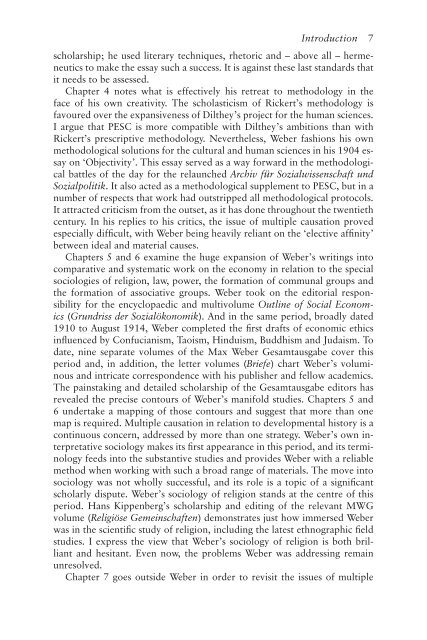Understanding Weber
Understanding Weber
Understanding Weber
Create successful ePaper yourself
Turn your PDF publications into a flip-book with our unique Google optimized e-Paper software.
Introduction 7<br />
scholarship; he used literary techniques, rhetoric and – above all – hermeneutics<br />
to make the essay such a success. It is against these last standards that<br />
it needs to be assessed.<br />
Chapter 4 notes what is effectively his retreat to methodology in the<br />
face of his own creativity. The scholasticism of Rickert’s methodology is<br />
favoured over the expansiveness of Dilthey’s project for the human sciences.<br />
I argue that PESC is more compatible with Dilthey’s ambitions than with<br />
Rickert’s prescriptive methodology. Nevertheless, <strong>Weber</strong> fashions his own<br />
methodological solutions for the cultural and human sciences in his 1904 essay<br />
on ‘Objectivity’. This essay served as a way forward in the methodological<br />
battles of the day for the relaunched Archiv für Sozialwissenschaft und<br />
Sozialpolitik. It also acted as a methodological supplement to PESC, but in a<br />
number of respects that work had outstripped all methodological protocols.<br />
It attracted criticism from the outset, as it has done throughout the twentieth<br />
century. In his replies to his critics, the issue of multiple causation proved<br />
especially difficult, with <strong>Weber</strong> being heavily reliant on the ‘elective affinity’<br />
between ideal and material causes.<br />
Chapters 5 and 6 examine the huge expansion of <strong>Weber</strong>’s writings into<br />
comparative and systematic work on the economy in relation to the special<br />
sociologies of religion, law, power, the formation of communal groups and<br />
the formation of associative groups. <strong>Weber</strong> took on the editorial responsibility<br />
for the encyclopaedic and multivolume Outline of Social Economics<br />
(Grundriss der Sozialökonomik). And in the same period, broadly dated<br />
1910 to August 1914, <strong>Weber</strong> completed the first drafts of economic ethics<br />
influenced by Confucianism, Taoism, Hinduism, Buddhism and Judaism. To<br />
date, nine separate volumes of the Max <strong>Weber</strong> Gesamtausgabe cover this<br />
period and, in addition, the letter volumes (Briefe) chart <strong>Weber</strong>’s voluminous<br />
and intricate correspondence with his publisher and fellow academics.<br />
The painstaking and detailed scholarship of the Gesamtausgabe editors has<br />
revealed the precise contours of <strong>Weber</strong>’s manifold studies. Chapters 5 and<br />
6 undertake a mapping of those contours and suggest that more than one<br />
map is required. Multiple causation in relation to developmental history is a<br />
continuous concern, addressed by more than one strategy. <strong>Weber</strong>’s own interpretative<br />
sociology makes its first appearance in this period, and its terminology<br />
feeds into the substantive studies and provides <strong>Weber</strong> with a reliable<br />
method when working with such a broad range of materials. The move into<br />
sociology was not wholly successful, and its role is a topic of a significant<br />
scholarly dispute. <strong>Weber</strong>’s sociology of religion stands at the centre of this<br />
period. Hans Kippenberg’s scholarship and editing of the relevant MWG<br />
volume (Religiöse Gemeinschaften) demonstrates just how immersed <strong>Weber</strong><br />
was in the scientific study of religion, including the latest ethnographic field<br />
studies. I express the view that <strong>Weber</strong>’s sociology of religion is both brilliant<br />
and hesitant. Even now, the problems <strong>Weber</strong> was addressing remain<br />
unresolved.<br />
Chapter 7 goes outside <strong>Weber</strong> in order to revisit the issues of multiple




